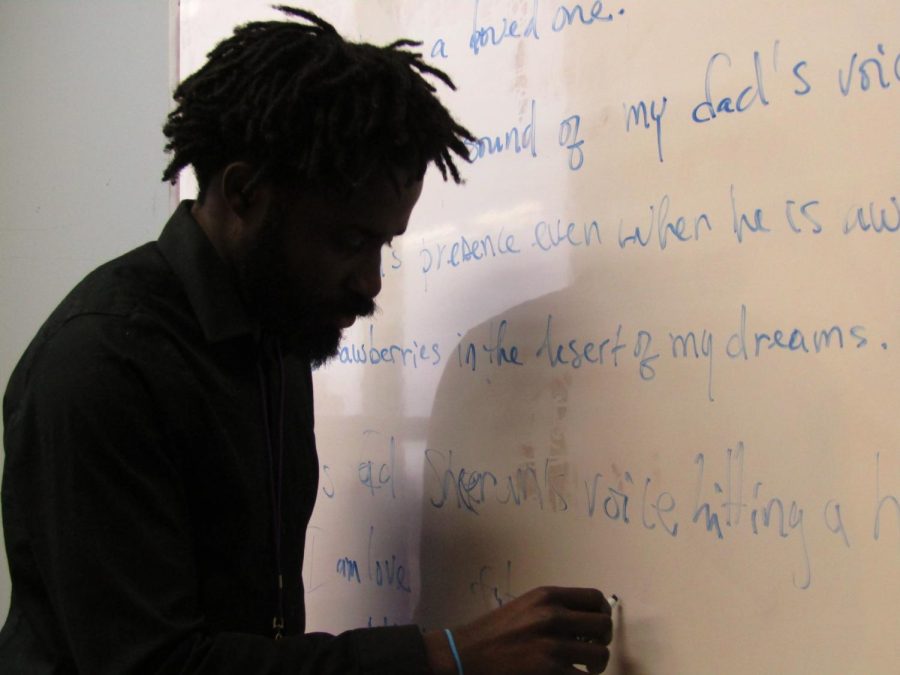A man with a vision: Sony Ton-Aime
Kent State University’s Wick Poetry Center provides a creative outlet for the Akron refugee and immigrant community through its “Traveling Stanzas” project.
North Hill, Akron, is home to a wide variety of ethnicities due to the International Institute of Akron (IIA) resettling large populations of immigrants and refugees to the area. The majority of the immigrant population comes from Southeast Asia, the Middle East and Africa.
“Urban Vision is a church and resource for the North Hill community as a whole. Part of our mission is to reach out to children in the community and give them the tools to succeed in education, like English skills that may not be spoken at home,” Assistant Director Evelina Seifert said.
Kent State graduate student Sony Ton-Aime has traveled to Akron to teach poetry sessions at Urban Vision for the past two years. Every Wednesday the church hosts after-school programs for school-aged students. Through reading and writing poetry, these children are able to express their feelings through a positive outlet.
“Being a child of refugees and immigrants is hard right now. They live in fear of losing each other, of losing their family and friends,” Ton-Aime said. “It’s only by writing about problems, letting it out, that helps.”
When Ton-Aime volunteers on Wednesdays, he teaches three sessions of poetry that are broken up by the ages of the children.
He begins each class with reading the same poems and allows the students to reflect and write their own poem with the same theme. The first and youngest group participates avidly, reading poems full of feeling and emotion.
“I am a girl in autumn. I am running from my fears. No—I am embracing them,” said Emma, one of the children from the youngest group of poets.
As the sessions continue, each group becomes less and less expressive with age.
“You see what living in a tougher neighborhood does to these kids,” Ton-Aime said. “When they are younger, they are so expressive, but then they lose it as they grow up. The last session, my oldest group, they try and use humor to hide. They see the reaction to emotion and fear and they learn they need to build a wall. They grow up and think their writing is too cheesy.”
Ton-Aime talks about his experience as an immigrant in America and how it reflects through his writing and encouragement of other children to find their voice.
He came from Haiti in 2010 and knew little to no English. It took a lot of “uncomfortable situations” and English as a Second Language (ESL) classes to assimilate further into American culture. After living in America for years, he lost his identity as to who he was in Haiti.
“If I went back home and wrote a love poem, my friends, my family, would not understand. It would be about girls with blonde hair, and we meet under trees with snow on the ground and in her hair. We don’t have snow in Haiti,” Ton-Aime said.
This made Ton-Aime feel as if he were two people in one body, and he didn’t want others feel like this, especially children. He continues his work at Urban Vision so the young writers and students use writing to find their identity, instead of feeling as if they have to hide a part of themselves.
“When we speak, we tend to allow ourselves to condition our words but writing; you put yourself into it. It’s easier to let yourself go,” Ton-Aime said. “What the students write is what they were feeling. It tells you how their lives were.”
Urban Vision includes several ways for individuals or groups to volunteer to help the North Hill area transform itself into a thriving community. Volunteers can help with K-12 education and tutoring, gym activities, life skills and much more throughout the year. All the opportunities Urban Vision offers can be found here.
Caroline Henneman is a humanities reporter. Contact her at [email protected].



